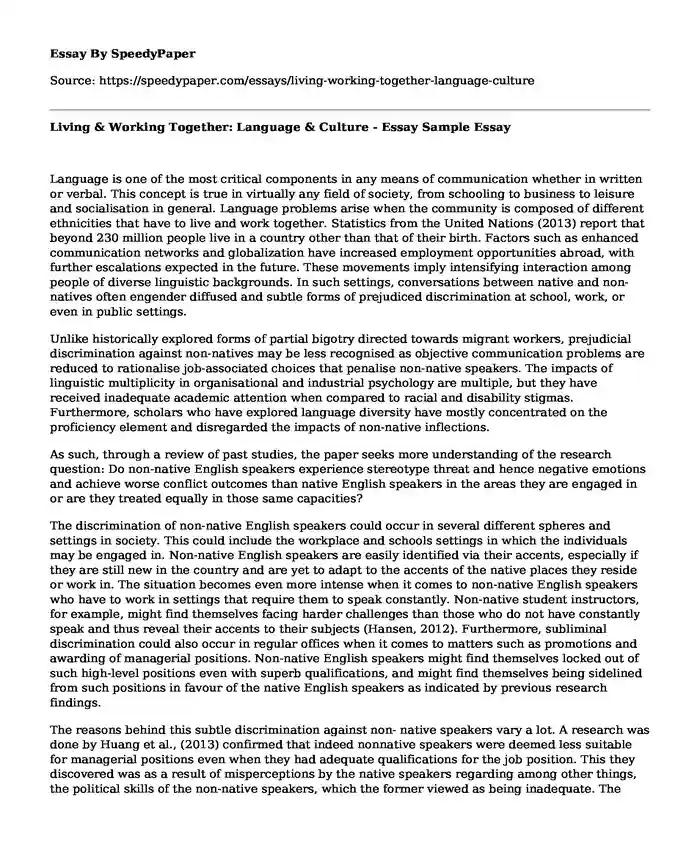
| Type of paper: | Research paper |
| Categories: | Globalization Discrimination Languages Intercultural communication |
| Pages: | 3 |
| Wordcount: | 632 words |
Language is one of the most critical components in any means of communication whether in written or verbal. This concept is true in virtually any field of society, from schooling to business to leisure and socialisation in general. Language problems arise when the community is composed of different ethnicities that have to live and work together. Statistics from the United Nations (2013) report that beyond 230 million people live in a country other than that of their birth. Factors such as enhanced communication networks and globalization have increased employment opportunities abroad, with further escalations expected in the future. These movements imply intensifying interaction among people of diverse linguistic backgrounds. In such settings, conversations between native and non-natives often engender diffused and subtle forms of prejudiced discrimination at school, work, or even in public settings.
Unlike historically explored forms of partial bigotry directed towards migrant workers, prejudicial discrimination against non-natives may be less recognised as objective communication problems are reduced to rationalise job-associated choices that penalise non-native speakers. The impacts of linguistic multiplicity in organisational and industrial psychology are multiple, but they have received inadequate academic attention when compared to racial and disability stigmas. Furthermore, scholars who have explored language diversity have mostly concentrated on the proficiency element and disregarded the impacts of non-native inflections.
As such, through a review of past studies, the paper seeks more understanding of the research question: Do non-native English speakers experience stereotype threat and hence negative emotions and achieve worse conflict outcomes than native English speakers in the areas they are engaged in or are they treated equally in those same capacities?
The discrimination of non-native English speakers could occur in several different spheres and settings in society. This could include the workplace and schools settings in which the individuals may be engaged in. Non-native English speakers are easily identified via their accents, especially if they are still new in the country and are yet to adapt to the accents of the native places they reside or work in. The situation becomes even more intense when it comes to non-native English speakers who have to work in settings that require them to speak constantly. Non-native student instructors, for example, might find themselves facing harder challenges than those who do not have constantly speak and thus reveal their accents to their subjects (Hansen, 2012). Furthermore, subliminal discrimination could also occur in regular offices when it comes to matters such as promotions and awarding of managerial positions. Non-native English speakers might find themselves locked out of such high-level positions even with superb qualifications, and might find themselves being sidelined from such positions in favour of the native English speakers as indicated by previous research findings.
The reasons behind this subtle discrimination against non- native speakers vary a lot. A research was done by Huang et al., (2013) confirmed that indeed nonnative speakers were deemed less suitable for managerial positions even when they had adequate qualifications for the job position. This they discovered was as a result of misperceptions by the native speakers regarding among other things, the political skills of the non-native speakers, which the former viewed as being inadequate. The main fear by the native speakers was that the non-native speakers might lack the skills to influence others in decisions touching on the running of the companies they aspire to run and thus may result in a below average performance as compared to the native speakers.
Reference
Hansen, S. (2012). An Analysis of Linguistic Discrimination: Undergraduate Reactions to Nonnative Instructors (Doctoral dissertation).
Psychology, *Journal, and Workplace Speakers. "Workplace Discrimination Against Non-Native Speakers." Ioatwork.com. N.p., 2019. Web. 12 Apr. 2019.
Russo, M., Islam, G., & Koyuncu, B. (2016). Non-native accents and stigma: How self-fulfilling prophesy can affect career outcomes. Retrieved from: http://www.academia.edu/33291372/Non-native_accents_and_stigma_How_self-fulfilling_prophesies_can_affect_career_outcomes
Cite this page
Living & Working Together: Language & Culture - Essay Sample. (2022, Dec 27). Retrieved from https://speedypaper.com/essays/living-working-together-language-culture
Request Removal
If you are the original author of this essay and no longer wish to have it published on the SpeedyPaper website, please click below to request its removal:
- Essay Sample about Mexican Americans Between 1940s and 1970s
- Free Paper Example: Audit of Secondo SA and Its Consolidation Report
- Essay Sample Dedicated to the Impact of Climate Change on the Ozone Hole
- Essay Example Comprising the Multiple Regression Project
- Essay Sample on Similarities and Differences Between 'The Hate You Give' Movie and Book
- United States History. Free Paper
- Situational Awareness of Speeding. Free Essay
Popular categories




